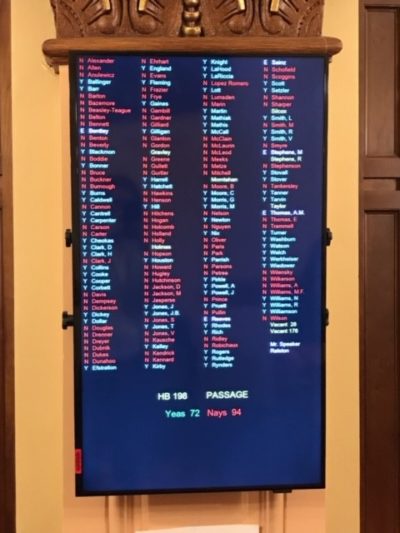Hospital industry lobbying against health care regulatory changes paid off Thursday when the Georgia House voted against major certificate-of-need (CON) legislation by a 94-72 margin.

House Bill 198 remained alive temporarily after the chamber approved a motion to reconsider the legislation. But by late afternoon, the lead sponsor, Rep. Matt Hatchett (R-Dublin), said the bill would not be brought back up on Thursday, which was the 2019 General Assembly session’s Crossover Day.
That day is the deadline when a piece of legislation is generally considered dead unless it has passed at least one chamber.
But Hatchett said the CON effort ‘’is not dead.’’ He said he would work on changes to the bill, and seek to have the new language attached to other legislation, which is how some past bills that fell short on Crossover Day were revived. “I think we can come to some satisfactory agreement and compromise,’’ he told GHN.

CON regulates how health care facilities function in Georgia. A provider must get a “certificate of need” from the state to proceed with a major project, such as building or expanding a medical facility or changing what services are available to patients.
Leading hospital groups have fought hard against a broad CON revamp, saying it would hurt existing hospitals, including those in rural Georgia. Proponents say it would spark competition, increase access to services, and reduce health care costs.

Hatchett, in the floor discussion of the bill, called the legislation a modernization of CON, and not a repeal. “CON will still be in existence’’ if the bill passes, he said.
The bill’s provisions included a limitation on which health care entities can object to a CON application. Instead of allowing any Georgia hospital to oppose a project, the legislation would require that an objecting facility be located within a 35-mile radius of the proposed site.
“It is not fair for a hospital in Ringgold [to have the right] to object to [a project] in Thomasville,” said Rep. Terry England (R-Auburn), a sponsor of the bill. Ringgold is in North Georgia near the Tennessee line, while Thomasville is in South Georgia near the Florida line.
England said the legislation would “move health care in Georgia into the 21st century.’’
Provisions included:
** Giving Cancer Treatment Centers of America (CTCA) a pathway to add more beds and serve more Georgia patients at its Newnan hospital
** Lifting CON restrictions on mental health and substance abuse facilities
** Allowing cardiology ambulatory surgery centers
** Increasing financial thresholds for hospital construction and medical equipment
** Permitting a sports medicine center to be built in Alpharetta
** Requiring transparency for nonprofit hospitals’ financial holdings

** Strengthening the indigent care requirements for hospitals
** Allowing freestanding emergency departments owned by hospitals
The floor debate drew some questions about CTCA , the sports medicine center and ambulatory surgery centers. But no opponent took to the well to outline criticisms of the bill.
Rep. David Stover, a Newnan Republican, told fellow lawmakers that with the current system, “we’re driving the cost of health care up.’’
“CON needs to change,’’ Stover said. “It’s killing our state. It’s killing our access to health care.’’
Rep. Penny Houston (R-Nashville) decried a hospital-backed ad campaign that opposed the CON overhaul. She was referring to a TV commercial, funded by a group of non-profit hospitals, which urged defeat of the bill.
“CON has not helped us,’’ Houston said.
Hatchett told lawmakers before the vote, “This bill is about transparency with our hospitals. We have hospitals in our state that are suffering. We’ve got hospitals that are making hundreds of millions of dollars. . . . Let’s lower health care costs in this state.’’
The House had an initial vote to amend the bill to raise the rural hospital tax credit program to $100 million from its current $60 million. That amendment was approved 99-71. But the final count on the amended legislation made that change moot.

CTCA, a national chain that has worked for years to ease restrictions on it in Georgia, said it was disappointed by the outcome. “There are many disappointed with the outcome of today’s vote – us included,’’ said Ray Williams, a lobbyist representing CTCA. “But we will continue to fight to give more Georgians access to the cancer care they want and need.”

